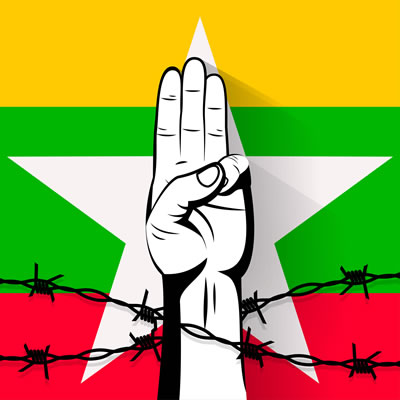
“Sir, are you aware of what is happening to our country?” That was the question put to me by my students in Bhamo, my mission place in Myanmar (formerly Burma).
On the first of February this year I woke up and was soon wondering. When I turned on my mobile phone to check the time and messages, there was no network signal. I wondered if there was something wrong with my SIM card. However, when I heard from my companions that they also experienced the same problem, although we had different network subscriptions, there was a growing sense that something was going on, and we wondered what was the real reason behind the “malfunctions” of the communication system.

A local priest was able to clarify all that soon. The military had started a coup because they did not accept the results of the national elections, and they had declared a year-long state of emergency. On that day they declared martial law and prevented all means of contact and information transmission including a news blackout.
In response to this the people of Myanmar organized a huge nationwide protest. Uniformed military personnel were visible in most corners of the towns to stop and to arrest people, but it did not stop the people from fighting for what was right for their countrymen. What the citizens of Myanmar want is for the military to respect their vote in favor of the Democratic party.
The youth were the most active in the protests, and some of them were my students. There were times they asked me “Sir, are you aware of what is happening to our country?” “Yes, I am aware,” I answered. “But why are you not joining us in our fight?” they added. I simply told them, “Even though I would like to join you in your fight, it is not practical for me because I am a foreigner; however I can give you my support in other ways.” I felt that they understood. It was one of the most frustrating moments in my life that I could not extend my full support to them. I planned to continue to offer help in the best way that I could through social media. The protests continued and there was violence and some killings, and many young people were arrested.
Since we were unclear about what was happening we invited the bishop for a lunch meeting at our lay missionary house, and he accepted it. During the meal we asked about the current situation and about the status of foreigners in the country. He told us, “Most of the foreigners have left already, especially those who live in the big cities because their safety is threatened and because they were slowly losing their businesses, and in your case I think you should go home for a while.” He mentioned that more than once, and he explained that the situation could get worse and it was hard to be certain about what might happen if we waited for the circumstances to improve.
After our meal with the bishop, we informed the Columban Myanmar Mission Unit Coordinator and the Central Leadership Team about the bishop’s suggestion, and they supported it. The next day we registered ourselves with the Philippine Consulate for a repatriation flight which had been offered to us. Getting to Yangon International Airport was a big challenge for us because all domestic flights were cancelled and there were roadblocks with several checkpoints for those travelling by land. Fortunately the bishop was able to arrange safe passage for us.
From Yangon we caught the repatriation flight home to the Philippines but we arrived with heavy hearts and mixed emotions. It was not easy to say goodbye to the people whom we worked with. We had built up good relationships, and we felt we had abandoned them in their time of difficulty. However, despite all the chaos, they are also hopeful that this time will pass and better days will come soon.
Now I have finished my holidays in my hometown, and I am showing my support to the Myanmar people by shouting their sentiments and the ongoing news of their country through social media. This really means a lot for them, because it was their only request to me. They asked me to participate through my post as soon as I arrived in the Philippines.
I think that the whole world knows already the struggles of Myanmar, and we still need to continue praying that their cry for freedom be heard and that there will be justice for the victims.
Currently, Columban lay missionary Michael Javier is helping in the ministries in Barra Sub-Parish in Opol, Misamis Oriental, Philippines, where lay missionaries from Fiji and the Kingdom of Tonga are serving. He is also helping with the activities of the Mission Promotion Team in the region.